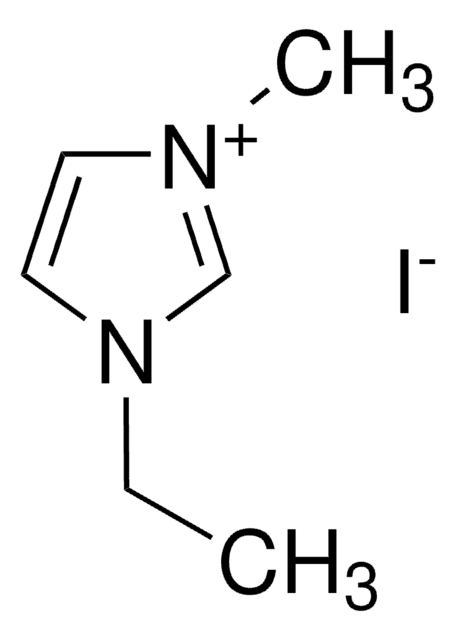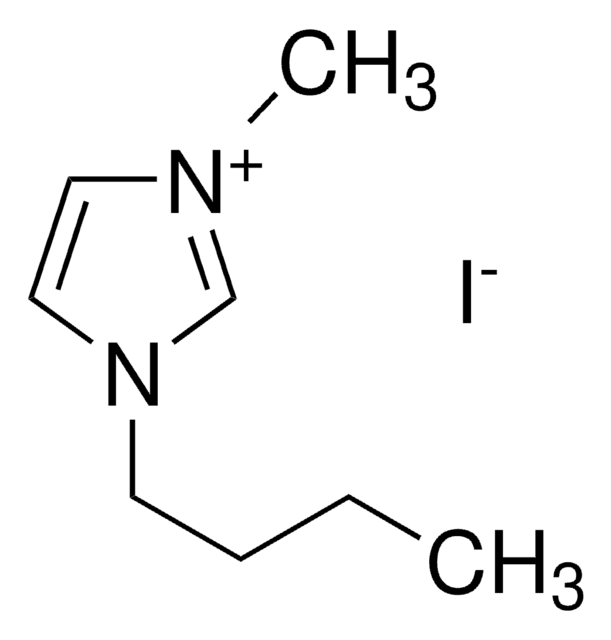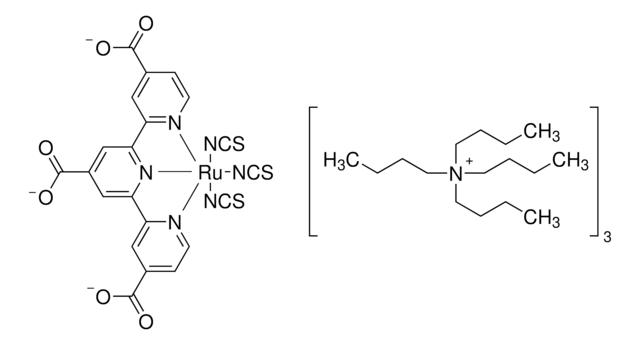791555
Titania paste, active opaque
Synonyme(s) :
Greatcell Solar® 18NR-AO Titania Paste, TiO2 paste
About This Item
Produits recommandés
Description
Crystal Structure: > 99% anatase (analysis carried out on starting material, prior to paste manufacture)
Forme
paste (cream)
Concentration
27.0 wt. %
Taille moy. des particules
20 nm (active)
≤450 nm (scatter)
Viscosité
40000-55000 mPa.s(20 °C) (Analysis carried out with 20mm 4 degree cone/plate; 40 s-1))
Chaîne SMILES
[Ti](=O)=O
InChI
1S/2O.Ti
Clé InChI
GWEVSGVZZGPLCZ-UHFFFAOYSA-N
Description générale
Application
The dispersed scattering particles in Active Opaque Titania Paste formulation lead to enhanced DSC performance through the large surface/volume ratio of the sintered film.
Active Opaque Titania Paste has a blend of active anatase particles (~20nm) and larger anatase scatter particles (up to 450nm).
After drying; this paste must be fired at or above 500°C. This results in an opaque sintered layer with film thickness of 7-8μm for one printed layer and ~15μm for two layers; when using a 48T mesh.
This paste exhibits optimal rheological properties that provide good surface uniformity and contain organic binders specially formulated to provide versatile porosity suitable for a range of dye/electrolyte systems.
Storage: Store in the dark at 20°C
Informations légales
Greatcell Solar® is a registered trademark of Greatcell Solar
Mention d'avertissement
Warning
Mentions de danger
Conseils de prudence
Classification des risques
Eye Irrit. 2 - Skin Irrit. 2
Code de la classe de stockage
10 - Combustible liquids
Classe de danger pour l'eau (WGK)
WGK 1
Point d'éclair (°F)
195.8 °F
Point d'éclair (°C)
91 °C
Faites votre choix parmi les versions les plus récentes :
Déjà en possession de ce produit ?
Retrouvez la documentation relative aux produits que vous avez récemment achetés dans la Bibliothèque de documents.
Les clients ont également consulté
Articles
Professor Shinar (Iowa State University, USA) summarizes the developments of a variety of sensor configurations based on organic and hybrid electronics, as low-cost, disposable, non-invasive, wearable bioelectronics for healthcare.
Few Monolayer Atomic Layer Deposition (ALD) on Surfaces and Interfaces for Energy Applications
Dye-sensitized solar cells (DSCs) are 3rd generation solar cells combining the promise of high efficiency with low production costs.
Organic photovoltaics (OPVs) represent a low-cost, lightweight, and scalable alternative to conventional solar cells. While significant progress has been made in the development of conventional bulk heterojunction cells, new approaches are required to achieve the performance and stability necessary to enable commercially successful OPVs.
Notre équipe de scientifiques dispose d'une expérience dans tous les secteurs de la recherche, notamment en sciences de la vie, science des matériaux, synthèse chimique, chromatographie, analyse et dans de nombreux autres domaines..
Contacter notre Service technique





![Spiro[9H-fluorene-9,9′-[9H]xanthene]-2,2′,7,7′-tetramine](/deepweb/assets/sigmaaldrich/product/structures/225/593/3b5858b3-0993-43eb-97ee-3f0d2a1142dc/640/3b5858b3-0993-43eb-97ee-3f0d2a1142dc.png)

